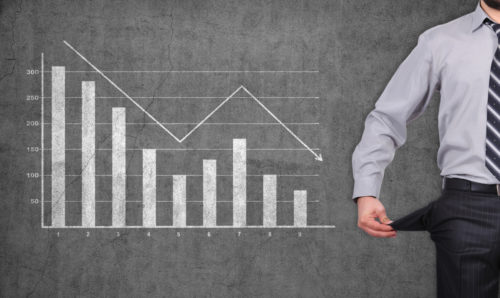The Great Recession had a negative impact on the finances of most Americans, including those of retirement age. Many seniors and those nearing retirement lost a sizable portion of their investments in the 2008 financial crisis. Although predictions were often dire at the time, many retiree savings funds bounced back in the next decade. While the impact of the recession on baby boomers was more modest than other generations, many older people are delaying retirement in order to recoup the losses they suffered during the recession.
Table of Contents
Effects of the Recession on Retirement
The Great Recession had a widespread impact on those nearing retirement age. While those with houses tended to fare better than those without, many people lost properties to foreclosure during the recession. Baby boomers also suffered from a loss of wealth during the financial crisis in both their personal savings and retirement assets. Many retirees also struggled to find appropriate healthcare in the wake of the financial crisis.
Housing
Baby boomers who were already homeowners or retired were somewhat insulated from the financial crash. Those almost at retirement age, however, bore the brunt of the impact from the recession. In 2016, more than 19 million older adults lived in unaffordable or inadequate housing as the baby boomers hardest hit by the recession began reaching retirement age.
After the collapse of the subprime mortgage market and the subsequent financial crisis, many baby boomers found themselves no longer able to afford the mortgage payments for their homes. This was exacerbated by predatory lending practices, high interest rates, and fluctuating payment terms. During the crisis, many people lost their homes to foreclosure, which not only impacted their housing but also deprived them of a valuable investment asset.
Baby boomers with less financial security were even less insulated from the crash than more affluent members of their generation. As they age into retirement, many baby boomers worry about being able to afford adequate and accessible housing, and are afraid of growing old in poverty rather than being able to enjoy their retirement years.
Wealth
Many baby boomers nearing retirement age took a sizable hit to their overall wealth. Older people not only had more money to lose during the recession, but also had less time to make it back before they reached retirement age. Overall, baby boomers experienced a decline in wealth of an average of $72,000 from 2007 to 2011, marking a significant loss even for the well-off. In percentage terms, however, households headed by baby boomers still experienced a smaller decline in wealth than households headed by members of other generations.
Accounting for other factors, including future Social Security payments, baby boomers experienced a more modest decrease in wealth than other generations. Between 2006 and 2012, individuals in their 50s suffered a decline in wealth of 3.6%. Overall, while baby boomers suffered financially during the Great Recession, their wealth was somewhat less impacted than Gen X and millennials.
Health
The Great Recession also had a negative impact on healthcare access for older Americans. In general, economic wellbeing and health are closely linked, with more affluent people better able to afford preventative care and healthy lifestyle options. For those who experience adverse financial circumstances, such as during a recession or financial crisis, economic concerns can have a drastic impact on their health. Adults who lost their jobs during the recession had a significantly elevated risk of death, even compared with those who lost their job during a period of relative economic stability. Economic recessions are also associated with issues with depression and mental health, particularly in vulnerable populations hardest hit by a financial crisis.
In addition to these struggles, older Americans of retirement age often found it difficult to access and afford quality healthcare. Without access to employer-sponsored healthcare after retiring or becoming laid-off, but not yet old enough to qualify for Medicare, some baby boomers had limited access to healthcare options, and may even have incurred further medical debt as a result.
With more health problems related to aging than other, younger generations, limited access to healthcare represented a significant personal and financial setback. In general, lack of wealth also affected seniors’ ability to go to the doctor and receive adequate healthcare that met their needs.
401(k) Savings Plans
Another way in which the Great Recession affected seniors was in their retirement savings and 401(k)s. In some cases, baby boomers nearing retirement saw their savings wiped out by over 40%. Because of their age and proximity to retirement, many seniors had a diminished ability to recoup these losses when compared to younger generations. Although they had planned for a comfortable retirement, many baby boomers saw these hopes dashed in the aftermath of the 2008 financial crisis.
The Baby boomer decline in 401(k) savings was also influenced by stagnant growth leading up to and following the Great Recession. Sometimes referred to as the “lost decade,” much of the 2000s saw low job growth and poor performance in the stock market.
Because of these circumstances, the investment portfolios of many baby boomers failed to grow as quickly as they had hoped. The recession and its aftermath only compounded failures in the stock market, resulting in a much more disappointing retirement savings fund for many. These trends suggest that an increasing number of retirees will experience downward financial mobility in retirement, with some even slipping below the poverty line.
Are We in a Baby Boomer Retirement Crisis?
Because of the impact on their savings and the slow economic growth both before and after the 2008 financial crisis, many baby boomers are working well into their 60s and 70s, delaying retirement as long as possible. While the age of retirement had already been increasing for several decades, the Great Recession may have influenced even more older Americans to remain in the workforce.
While some Americans continue working voluntarily to rebuild their retirement funds and become more financially comfortable in retirement, some workers have no choice but to continue working. For some baby boomers, especially those whose savings were wiped out during the Great Recession or who had meager savings to begin with, money from working is the only thing keeping them afloat.
Because of their age, many seniors have few opportunities to recoup the losses suffered during the 2008 financial crisis. Instead, they are often faced with a lower standard of living and a much smaller yearly income than they had planned.
In addition, many baby boomers of retirement age demonstrate an increased reliance on Social Security, which is one of the most common sources of retirement income. Early retirees may be forced to draw on these funds out of necessity before they reach full retirement age, resulting in a permanent impact to the benefits they receive. Retirees who begin collecting Social Security at 62 rather than 66 will face a 25% decrease in their monthly benefits.
The retirement crisis among baby boomers also affects younger generations, as more seniors decide to remain at their jobs. This often means that Gen X and millennial workers have fewer opportunities to receive promotions and make their way up the corporate ladder.
Overall, while the effect of the 2008 financial crisis was more moderate among baby boomers than among other generations, older Americans still felt the effects of the crash, and many are still recovering today. The Great Recession will continue to have a significant financial impact in the lives of many older Americans moving forward.
Image Source: https://depositphotos.com/





